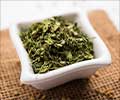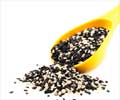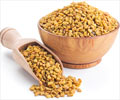Fenugreek seeds are known to have diverse health benefits. This versatile spice can also be used for increasing breast milk supply in lactating women.

Fenugreek Seeds As a Galactagogue
There are many herbal supplements available that have been shown to be effective in increasing milk production. Fenugreek seeds are used as an herbal galactagogue - a substance that promotes lactation in humans. Mothers who are unable to meet their infants' breastfeeding needs may benefit from galactagogues. Fenugreek seed is one of the most commonly used galactagogues. It has active ingredients that have the ability to increase milk production for mothers.
Though researchers state that there is not enough evidence for the mechanism of fenugreek seeds to increase breast milk supply in breastfeeding women; however it is usually preferred over several prescription medications to increase breast milk production. It is preconceived that a plant or herb is safer than a pharmaceutical drug because it is natural. Fenugreek seeds are listed on the U.S. Food and Drug Administration's GRAS list (Generally Recognized As Safe).
Fenugreek seeds are a good source of fiber, omega-3 fatty acids, B vitamins, iron, calcium and antioxidants such as beta-carotene. The active ingredient in fenugreek seeds called diosgenin increases milk production in lactating mothers.
Another study examined milk production in exclusively breastfeeding women. Ten women kept diaries of their breast milk production for two weeks. The first week was the baseline milk production. During the second week, three capsules of fenugreek seed powder were given three times a day. This study used each participant as her control in comparing breast milk production with and without the fenugreek seed supplementation. Average breast milk volume for week 1 and week 2 were compared; the average daily milk volume for week 1 was 207 ml compared to 464 for week 2.
To increase breast milk production, fenugreek seeds can be taken in the form of a capsule, or tea. However, researchers say that tea is weaker than the capsule form. The dosage for taking fenugreek seeds a supplement is 2 to 3 capsules (3.5 - 7.3 grams) thrice a day or three teaspoons of fenugreek seed powder a day. In one or two days, there will be an increase in breast milk production.
Studies have shown that smaller doses of fenugreek seeds 1 - 2.5 grams per day have not been found to be effective in increasing milk supply. Fenugreek seeds can also be added to many dishes, especially vegetables, and can be added to parathas, pooris, and stuffed roti. Supplementation of fenugreek can be discontinued after milk supply is increased, as long as a mother can regularly breastfeed.
Caution
- The Food and Drug Administration (FDA) has regarded fenugreek as safe for human consumption as a spice or natural seasoning and as a plant extract but, should not be recommended for pregnant women.
- It is wise to consult a health care provider before taking any herbal remedy for milk supply issues. Fenugreek seeds may cause contractions or an allergic reaction. Thus, it is advisable for pregnant women not to take fenugreek.
- Women who are allergic to peanuts or soybeans should avoid fenugreek. Taking more than 100 grams of fenugreek seeds a day may cause diarrhea and nausea in mother and rare cases it can affect the baby as well.
- Some other side effects that may occur when fenugreek seeds are taken in excess than the recommended dosage are headaches, dizziness and stomach cramps.
- Fenugreek seeds can have effects such as lowering blood sugar levels, and may cause allergy in some those with a history of asthma.
1. http://www.lowmilksupply.org/fenugreek.shtml
2. http://www.medelabreastfeedingus.com/tips-and-solutions/116/fenugreek---an-herb-to-increase-milk-supply
3. http://www.analyticalarmadillo.co.uk/2011/09/spotlight-on-fenugreek-does-natural.html
4. https://hort.purdue.edu/newcrop/med-aro/factsheets/FENUGREEK.html
5. http://www.babycenter.in/a1049926/how-to-increase-breastmilk-supply
Source-Medindia














